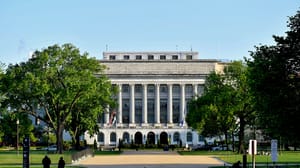New legislation would support wildlife habitat on private lands
Bill makes virtual fencing eligible for USDA research.
May 9, 2024

U.S. Senator Martin Heinrich (D-N.M.), a member of the Senate Energy and Natural Resources Committee, and U.S. Representatives Gabe Vasquez (D-N.M.) and Ryan Zinke (R-Mont.) have introduced the Habitat Connectivity on Working Lands Act to help the USDA scale up locally-led, voluntary big game migration pilot projects with private landowners, conservationists and agriculture groups.
“Private landowners and agricultural producers in New Mexico and across the West play a key role in our effort to increase habitat connectivity and improve wildlife migration,” said Heinrich. “I'm proud to introduce this bipartisan legislation with Representatives Vasquez and Zinke to invest in proven USDA conservation practices and encourage land stewards to embrace new tools like virtual fencing to help us protect iconic big game species like pronghorn antelope, Rocky Mountain elk, and mule deer.”
“Ranchers are vital to our economy and to our lands, often sharing the same spaces as wildlife. The Habitat Connectivity on Working Lands Act safeguards our diverse species while supporting ranchers’ livelihoods. We must find balance where both can thrive, and my bill does just that,” said Vasquez. “As a member of the House Agriculture Committee, I will always look for common ground, whether between ranchers and conservationists, Republicans and Democrats or New Mexicans and Montanans.”
“Some of our most iconic North American big game traverse thousands of miles on their migration routes every year. As Secretary I signed a secretarial order establishing a federal-state-private sector partnership to maintain wildlife access to corridors. This bill takes it a step further, working directly with farmers to protect migration corridors during migration seasons while respecting private property rights,” Zinke said. “We all know that animals go where animals want to go, and more often than not, that's dependent upon natural features like water, terrain and vegetation, rather than whether land is owned by the BLM, state or private landowners. Farmers and ranchers are some of the best conservationists I know. Few are more reliant on a healthy landscape than our producers and growers. I appreciate Congressman Vasquez working with me again to prove that some issues are above red or blue, and are just red white and blue.”
The Habitat Connectivity on Working Lands Act will support local farmers, producers and landowners who want to make it easier for big game species to migrate across their lands. The legislation will help USDA prioritize the creation and maintenance of wildlife habitat connectivity and wildlife migration corridors through their conservation programs. It will also make it easier for agricultural producers to participate in programs that benefit wildlife migrations and habitat connectivity. Additionally, the legislation makes virtual fencing eligible for USDA research and extension grants, encouraging research on the benefits of virtual fencing. Conventional fencing across the West results in wildlife entanglement, which is often lethal.
The bill would help USDA scale up work that began with its Migratory Big Game Initiative. That initiative launched in Wyoming and recently expanded into Idaho and Montana. Under the initiative, USDA’s Natural Resources Conservation Service and Farm Service Agency are utilizing voluntary and incentive-based programs to support conservation on grasslands, shrublands, and forested habitats located on Tribal and privately owned working lands.
This bill builds on Heinrich and Vasquez’s longtime support for connecting wildlife corridors, including the $350 million Wildlife Crossings Pilot Program that Heinrich helped to secure as part of the 2022 Bipartisan Infrastructure Law. In December, Heinrich, Vasquez, and U.S. Senator Ben Ray Luján (D-N.M.) announced a $480,000 investment for the Mescalero Apache Tribe from the Department of Transportation’s new Wildlife Crossings Pilot Program to improve wildlife crossings along US-70.
In 2019, New Mexico enacted the Wildlife Corridors Act to make it safer for animals to migrate across the state with a focus on reducing wildlife and vehicle collisions. That state law directed the New Mexico Department of Transportation in partnership with the New Mexico Department of Game and Fish to develop a comprehensive New Mexico Wildlife Corridors Action Plan to identify and improve safety in wildlife-vehicle collision hotspots on roadways that pose a particularly high risk to the traveling public.
The Habitat Connectivity on Working Lands Act has been endorsed by the Theodore Roosevelt Conservation Partnership, New Mexico Wildlife Federation, National Wildlife Federation, Backcountry Hunters and Anglers, National Audubon Society, National Parks Conservation Association, Montana Wildlife Federation, North American Grouse Partnership, Pheasants Forever, Public Lands Council, Quail Forever, Rocky Mountain Farmers Union, The Pew Charitable Trusts, Wildlands Network, the Center for Large Landscape Conservation, Western Landowners Alliance, and National Cattlemen’s Beef Association.
“Working lands provide key habitat for migratory fish and wildlife, including big game like elk and mule deer. USDA’s voluntary conservation programs need to work together to support farmers and ranchers who create and enhance this habitat, and the next Farm Bill is our opportunity to make that happen,” said Becky Humphries, CEO, Theodore Roosevelt Conservation Partnership. “The Habitat Connectivity on Working Lands Act removes unnecessary barriers to working lands stewardship. The TRCP thanks Senator Heinrich and Congressmen Zinke and Vasquez for their leadership on this bill and urges its inclusion in the Farm Bill.”
“Farmers and ranchers have an immense opportunity to help wildlife endure and thrive for future generations,” said Aviva Glaser, senior director for agriculture policy, National Wildlife Federation. “This common-sense, bipartisan legislation will help farmers, ranchers, and landowners support the wildlife that migrate through their fields, pastures, and forests — and the hunters, anglers, birders, and outdoor recreationists that enjoy them. Congress should include this common sense, no-cost proposal in the 2024 Farm Bill and strengthen U.S. Department of Agriculture voluntary conservation programs.”
The text of the bill is here.
You May Also Like



